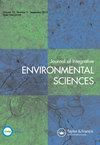一个评估社会现金转移支付在建设气候适应能力方面作用的框架
IF 3.5
4区 环境科学与生态学
Q3 ENVIRONMENTAL SCIENCES
Journal of Integrative Environmental Sciences
Pub Date : 2023-07-17
DOI:10.1080/1943815x.2023.2218472
引用次数: 0
摘要
气候变化对弱势群体的影响越来越大,并造成可怕的社会和经济后果,特别是对全球南方国家。管理当前和新出现的气候相关风险需要提高个人和社区的抵御能力,包括增强吸收、适应和变革能力。政策制定者目前正在考虑社会保护政策和计划通过促进这些能力,在建设气候适应能力方面所能发挥的作用。然而,人们对社会保护手段能在多大程度上影响这三种与复原力有关的能力了解有限。缺乏评估工具或框架可能导致社会保护提高气候适应能力的证据有限。特别是,似乎没有框架或工具可以帮助评估社会现金转移支付(SCT)在建设适应能力方面的作用。在多阶段文献综述的基础上,我们开发了一个适应能力结果框架(ACOF),可以帮助评估SCT对建立适应能力的贡献,从而评估复原力。然后使用印度尼西亚、赞比亚、埃塞俄比亚、孟加拉国和坦桑尼亚的SCT项目的影响评价和评估报告对该框架进行测试。研究发现,单是sct对适应能力结果的贡献有限,但将现金转移支付与营养或生计培训等其他组成部分相结合的干预措施则显示出积极的影响。我们发现ACOF可以支持SCT对适应能力贡献的评估。它可以帮助建立证据,评估影响,并且通过进一步的研究,可以促进对sct在提高气候适应能力方面的作用的了解。本文章由计算机程序翻译,如有差异,请以英文原文为准。
A framework to assess the role of social cash transfers in building adaptive capacity for climate resilience
Climate change is increasingly affecting vulnerable groups and resulting in dire social and economic consequences, especially for those in the Global South. Managing current and emerging climate-related risks will require increasing individual’s and communities’ resilience, including enhancing absorptive, adaptive, and transformative capacities. Policymakers are now considering the role that social protection policies and programmes can play in building climate resilience by contributing to these capacities. However, there is a limited understanding of the extent to which social protection instruments can influence these three resilience-related capacities. Lack of assessment tools or frameworks might contribute to limited evidence of social protection’s ability to increase climate resilience. In particular, there appear to be no frameworks or tools that help assess the role of social cash transfers (SCT) in building adaptive capacity. Based on a multi-staged literature review, we develop an adaptive capacity outcomes framework (ACOF) that can help assess SCT’s contribution to building adaptive capacity, and, consequently, resilience. The framework is then tested using impact evaluation and assessment reports from SCT programmes in Indonesia, Zambia, Ethiopia, Bangladesh, and Tanzania. The exercise finds that SCTs alone have a limited contribution to adaptive capacity outcomes, but interventions that combine cash transfers with other components such as nutrition or livelihood training show positive impacts. We find that the ACOF can support assessments of SCT’s contribution towards adaptive capacity. It can help build evidence, evaluate impacts, and through further research, can facilitate learning on SCTs' role in increasing climate resilience.
求助全文
通过发布文献求助,成功后即可免费获取论文全文。
去求助
来源期刊

Journal of Integrative Environmental Sciences
ENVIRONMENTAL SCIENCES-
CiteScore
3.90
自引率
0.00%
发文量
13
审稿时长
>12 weeks
期刊介绍:
Journal of Integrative Environmental Sciences (JIES) provides a stimulating, informative and critical forum for intellectual debate on significant environmental issues. It brings together perspectives from a wide range of disciplines and methodologies in both the social and natural sciences in an effort to develop integrative knowledge about the processes responsible for environmental change. The Journal is especially concerned with the relationships between science, society and policy and one of its key aims is to advance understanding of the theory and practice of sustainable development.
 求助内容:
求助内容: 应助结果提醒方式:
应助结果提醒方式:


